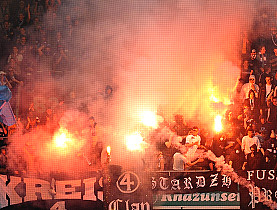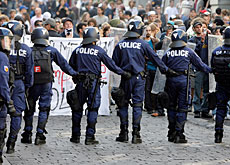Hooligan problem flares up again

With only a month to go before Euro 2008 kicks off in Basel, crowd violence at matches in Basel and Bern has raised several awkward questions.
Organisers say they are confident the tournament, which is being co-hosted by Switzerland and Austria, will be a safe success but the media are not so sure.
After Basel scored their second goal on Friday against FC Zurich – Basel eventually won the match 4-0 – a section of Zurich fans in the first tier lit flares and fireworks, which had been smuggled in, and threw them onto Basel fans below.
Problems continued after the game and a total of 45 people were injured, mostly lightly, although three people were taken to hospital. Twelve people were arrested.
There was also a punch-up the same evening involving around 100 people after the match between Young Boys of Bern and Neuchâtel Xamax, which the Bernese lost 3-1. Police dispersed the crowd with tear gas and plastic bullets, with one officer taken to hospital.
Despite this, Benedikt Weibel, the government’s Euro 2008 representative, told the Sonntag newspaper that he remained “convinced” that everything concerning security was under control and that such scenes would not happen during the tournament.
Martin Jäggi, head of security for Euro 2008, also said he was confident and that the tournament’s security plan would not be changed. He noted that the greater number of women and children at national matches, as opposed to club matches, meant violence was less likely to break out.
“Uneasy feelings”
Not everyone was so sure. “Are hooligans going to ruin Euro 2008?” was the headline in Blick, Switzerland’s biggest-selling tabloid, on Monday.
The Sonntag newspaper had detected “uneasy pre-Euro feelings – one month before the greatest sporting event that our country’s ever seen”.
The paper also wondered how it had been possible to smuggle potentially lethal fireworks into Basel’s stadium, which is where Switzerland will play all three of its group matches next month. It said that almost every European country other than Italy had managed to solve the problem of flares.
For the Berner Zeitung “the time has come to step in”, saying such images were damaging Switzerland’s reputation and proved that the hooliganism problem was not under control.
The paper reckoned it was “completely absurd” that police could not intervene in the Basel stadium, a private area, despite lives being clearly in danger.
Unfounded fears
The Zurich-based Tages-Anzeiger took a less dramatic tone, saying fears that such scenes could occur during Euro 2008 were unfounded.
“Extremist groups are linked primarily to club teams and not the national team,” it said, adding that Euro 2008 was a commercial event and therefore not of great interest to hooligans.
The Tages-Anzeiger admitted that violence outside the stadiums could not be ruled out – but that, it said, was always the case when people and alcohol are mixed. That however had nothing to do with football, it concluded.
The Basler Zeitung also believed the problem was limited to club football, telling all those who were concerned about violence at Euro 2008 to calm down: “During the tournament the stadium will be a high security zone.”
But it too warned that because flare-throwers could not get inside the stadium they would be outside – “probably in the fan zones”.
Harsher punishments
In the NZZ am Sonntag Christian Kern, head of the company that runs St Jacob’s Park stadium, called for “rapid reaction judges”, which he said had proved successful in Britain.
“You pick out the culprits and punish them immediately,” he said.
Kern believed that while most Swiss football hooligans were given mild fines, “if you endanger human life, you should be locked up”.
Blick also highlighted another issue which it said could prove problematic. German police, who have experience in close combat, are going to be used “when things get heavy” whereas their Swiss colleagues will just fire a few tear gas grenades from a distance, according to Blick.
But the Germans, it said, were not sure they wanted to be used just as “bully boys in a German uniform”.
swissinfo with agencies
Switzerland’s three-pronged security strategy mirrors the successful plan implemented in Germany during the 2006 World Cup. Organisers have said the tournament should be a “feast, not a fortress”.
The aim of the strategy is to develop cordial relations between police and fans while acting decisively should trouble break out.
In addition to police, private security firms will be present at stadiums and in fan zones.
Between 500 and 1,000 police officers from France and Germany will be drafted in during match days and to provide extra liaison with fans.
In the case of an emergency, about 15,000 army troops have been made available to the host cities, an offer that Geneva has declined. Should they be needed, soldiers would guard infrastructure rather than confront rowdy fans.

In compliance with the JTI standards
More: SWI swissinfo.ch certified by the Journalism Trust Initiative











You can find an overview of ongoing debates with our journalists here . Please join us!
If you want to start a conversation about a topic raised in this article or want to report factual errors, email us at english@swissinfo.ch.